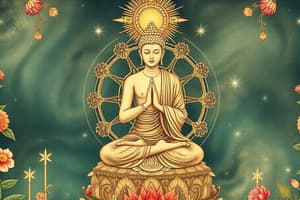Podcast
Questions and Answers
What is the primary cause of suffering according to the Four Noble Truths?
What is the primary cause of suffering according to the Four Noble Truths?
- Lack of mindfulness
- Aversion
- Having wrong understanding of reality
- Craving and ignorance (correct)
What is the path to the cessation of suffering according to the Four Noble Truths?
What is the path to the cessation of suffering according to the Four Noble Truths?
- The path of self-mortification
- The path of rebirth
- The path of meditation
- The Eightfold Path (correct)
Which of the following is not a part of the Eightfold Path?
Which of the following is not a part of the Eightfold Path?
- Right Intention
- Right Understanding
- Right Effort
- Right Karma (correct)
What is the purpose of the Eightfold Path?
What is the purpose of the Eightfold Path?
What is the first step in the Eightfold Path?
What is the first step in the Eightfold Path?
What is the ultimate goal of the Four Noble Truths?
What is the ultimate goal of the Four Noble Truths?
What is the concept of karma closely tied to in Buddhism?
What is the concept of karma closely tied to in Buddhism?
What is the goal of Buddhism in relation to karma?
What is the goal of Buddhism in relation to karma?
What is the main practice of Pure Land Buddhism?
What is the main practice of Pure Land Buddhism?
What is the goal of Pure Land Buddhism?
What is the goal of Pure Land Buddhism?
What is karma not just about in Buddhism?
What is karma not just about in Buddhism?
What is emphasized in Pure Land Buddhism?
What is emphasized in Pure Land Buddhism?
Flashcards are hidden until you start studying
Study Notes
Four Noble Truths
- The Four Noble Truths are the core teachings of Buddhism, believed to have been discovered by Siddhartha Gautama (the Buddha) during his enlightenment.
- The Four Noble Truths are:
- The truth of suffering: Suffering (dukkha) is an inherent part of life, and it arises from craving and ignorance.
- The truth of the origin of suffering: Suffering arises from craving, aversion, and ignorance.
- The truth of the cessation of suffering: Suffering can be eliminated by cutting off craving and ignorance.
- The truth of the path to the cessation of suffering: The path to the cessation of suffering is the Eightfold Path.
Eightfold Path
- The Eightfold Path is a set of guidelines for living a virtuous and ethical life, aimed at achieving the cessation of suffering.
- The Eightfold Path consists of:
- Right Understanding: Understanding the true nature of reality and the Four Noble Truths.
- Right Intention: Having the intention to renounce suffering and cultivate compassion.
- Right Speech: Speaking truthfully, kindly, and wisely.
- Right Action: Acting ethically and avoiding harm to oneself and others.
- Right Livelihood: Earning a living in a way that does not harm oneself or others.
- Right Effort: Making an effort to cultivate wholesome qualities and abandon unwholesome ones.
- Right Mindfulness: Being mindful of one's thoughts, feelings, and actions.
- Right Concentration: Cultivating concentration and wisdom through meditation.
Karma
- Karma refers to the idea that actions have consequences, and that the effects of our actions will influence our future experiences.
- Karma is not just a matter of reward or punishment, but rather a natural process of cause and effect.
- The concept of karma is closely tied to the idea of rebirth, where the effects of our actions can influence our future lives.
- The goal of Buddhism is to break the cycle of karma and rebirth, achieving liberation from the cycle of suffering.
Pure Land Buddhism
- Pure Land Buddhism is a branch of Mahayana Buddhism that emphasizes the attainment of rebirth in a pure land, a realm free from suffering and evil.
- The goal of Pure Land Buddhism is to attain rebirth in the pure land of Amitabha Buddha, where one can achieve enlightenment easily.
- Pure Land Buddhism is based on the idea of devotion to the Buddha and the recitation of his name, rather than on individual effort and merit.
- The practice of Pure Land Buddhism involves reciting the name of Amitabha Buddha, performing rituals and ceremonies, and cultivating a sense of devotion and faith.
Four Noble Truths
- The Four Noble Truths are the core teachings of Buddhism, discovered by Siddhartha Gautama (the Buddha) during his enlightenment.
- The Four Noble Truths are the truth of suffering, the truth of the origin of suffering, the truth of the cessation of suffering, and the truth of the path to the cessation of suffering.
The Truths
- The truth of suffering: Suffering (dukkha) is an inherent part of life, and it arises from craving and ignorance.
- The truth of the origin of suffering: Suffering arises from craving, aversion, and ignorance.
- The truth of the cessation of suffering: Suffering can be eliminated by cutting off craving and ignorance.
- The truth of the path to the cessation of suffering: The path to the cessation of suffering is the Eightfold Path.
Eightfold Path
- The Eightfold Path is a set of guidelines for living a virtuous and ethical life, aimed at achieving the cessation of suffering.
- The Eightfold Path consists of:
- Right Understanding: Understanding the true nature of reality and the Four Noble Truths.
- Right Intention: Having the intention to renounce suffering and cultivate compassion.
- Right Speech: Speaking truthfully, kindly, and wisely.
- Right Action: Acting ethically and avoiding harm to oneself and others.
- Right Livelihood: Earning a living in a way that does not harm oneself or others.
- Right Effort: Making an effort to cultivate wholesome qualities and abandon unwholesome ones.
- Right Mindfulness: Being mindful of one's thoughts, feelings, and actions.
- Right Concentration: Cultivating concentration and wisdom through meditation.
Karma
- Karma refers to the idea that actions have consequences, and that the effects of our actions will influence our future experiences.
- Karma is not just a matter of reward or punishment, but rather a natural process of cause and effect.
- The concept of karma is closely tied to the idea of rebirth, where the effects of our actions can influence our future lives.
- The goal of Buddhism is to break the cycle of karma and rebirth, achieving liberation from the cycle of suffering.
Pure Land Buddhism
- Pure Land Buddhism is a branch of Mahayana Buddhism that emphasizes the attainment of rebirth in a pure land, a realm free from suffering and evil.
- The goal of Pure Land Buddhism is to attain rebirth in the pure land of Amitabha Buddha, where one can achieve enlightenment easily.
- Pure Land Buddhism is based on the idea of devotion to the Buddha and the recitation of his name, rather than on individual effort and merit.
- The practice of Pure Land Buddhism involves reciting the name of Amitabha Buddha, performing rituals and ceremonies, and cultivating a sense of devotion and faith.
Studying That Suits You
Use AI to generate personalized quizzes and flashcards to suit your learning preferences.




